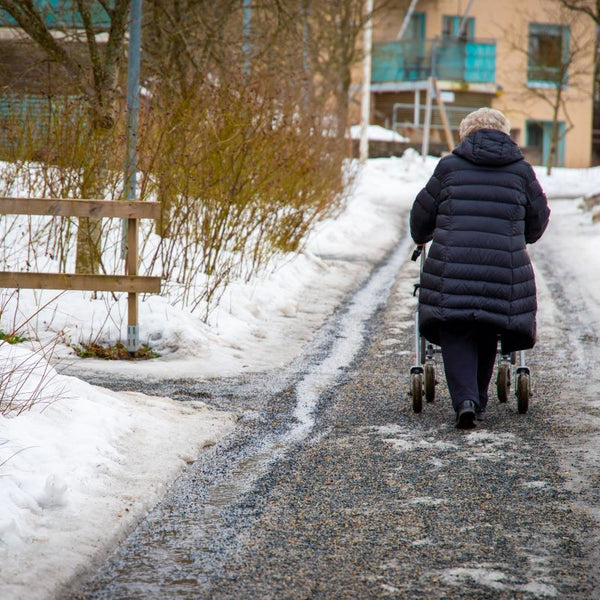Every year, Dementia Awareness Week brings everyone in the UK together to raise awareness about dementia, support those affected by it, encourage conversations, and promote better understanding. Taking Care elderly care expert Lauren Frake highlights how simple gardening tasks can alleviate symptoms of the disease affecting more than 944,000 people in the UK.
A dementia diagnosis can be devastating for both the individual and their family, and many carers struggle to know how to maintain the cognitive stimulation of the dementia sufferer whilst also ensuring their safety. This challenge is common for millions of families across the UK, and keeping their brains engaged can be overwhelming.
We understand how challenging it can be to care for someone who is suffering from dementia, and the strain of finding suitable activities or hobbies for them. The constant engagement and sensory stimulation while gardening can provide a welcome distraction and various therapeutic benefits for people with dementia. Many of our alarm users have also reported that gardening is a great place to start.
Lauren Frake
Elderly care expert at Taking Care
Lauren has teamed up with several gardening experts to raise awareness of why gardening is effective for dementia patients, as well as simple activities and plants that can help to reintroduce gardening activities safely and seamlessly into dementia sufferers' lives.
Explore some of the key first steps that you can take to help reintroduce your loved ones to gardening so they don't feel overwhelmed and confused.
Reintroduce the person to their garden and spend time exploring the environment
When reintroducing gardening to someone with dementia, one of the first steps is to ensure they feel safe in their environment. A good start is to walk them around their garden and let them feel and touch the plants – especially ones with bright colours and textures. This will help distract them and enable them to focus on what they are doing at that moment.
It is also good to provide some clear guidance on tasks around the garden they can get involved in and break them into manageable bitesize chunks, so they don't feel overwhelmed.
As much as gardening is a great social activity and you may provide some guidance at first, Lauren recommends encouraging your loved ones to take responsibilities so they feel a sense of independence. However, make sure to keep an eye on them so that they are safe and distant if they need you.
Explore sensory gardens
Nature Recovery Ranger for Centre of Sustainable Healthcare, Nick White, explains that one of the ways to view dementia is like shaking a full bookshelf, with your earliest memories at the bottom and your most recent memories at the top. When you shake the bookcase, the first books to fall are the ones at the top, representing your most recent memories, while those at the bottom, your core childhood and embedded memories, fall last.
For many people, being amongst nature and gardening is part of their core childhood memories, which is why gardening and being outdoors can be so beneficial and bring so much comfort to those suffering from dementia. Nick highlights that his experience of designing garden activities for people with dementia has revealed that sensory gardens and different types of plants can also help people with dementia.
We often design sensory gardens brimming with plants with calming colours, textures, and scents. The combination of these different types of sensory plants can often trigger the recollection of distant memories.
Nick White
Nature Recovery Ranger at Centre of Sustainable Healthcare
Simple tasks can still be very rewarding
Rebecca Van Den Boogaard, Vocational Horticulture Learning Tutor at Workbridge and St Andrew's Healthcare, a complex mental health charity, said:
"Many gardening activities can still be enjoyed by people with dementia, especially in the earlier stages of the disease. As a rule of thumb, spikey or toxic plants should be avoided, and the key is to keep it simple."
"Activities and plants they recommend are mowing, feeding the birds, growing fruit, vegetables, annuals, and herbs. Peas are easy to grow and a quick crop (and delicious eaten straight from the vine), as are lettuces, perpetual spinach, and radishes."
Sensory plants with strong scents and even flavours are excellent. Rebecca also recommends stocks, lavender, calendula, nasturtium, Mint, oregano, thyme, fennel, sweet peas, and common jasmine.
Explore seasonal plants to remind them about the time of year

Dr Susanne Lux, Project Manager for Pelargonium Europe said:
"Flowers and plants are well-known mood enhancers, and sitting or walking in a beautiful, blooming garden can positively affect our emotional wellbeing and mental health."
"For a person suffering from dementia-related memory loss, different varieties of plants may help to remind them of the time of year, such as daffodils at the start of spring or sun-loving plants like geraniums, which herald the onset of summer."
"The olfactory sense is very evocative, and it may be possible for intensely perfumed flowering plants to trigger happy memories whilst also having a soothing effect."
Peace of mind if a loved one has dementia
Living with dementia can be a real challenge, especially when your loved one lives at home. You may want to consider one of our dementia alarms, which have been designed to help keep track of a loved one with dementia, especially if they might wander off from home or get confused while they are out gardening.
Our range of dementia alarms all have GPS technology built-in, so your loved one’s location can always be tracked and help can be arranged if needed, by our 24/7 Emergency Resolution Team. Some devices can also have safe zones, so an alert is triggered if your loved one moves outside of the pre-set area.
This can offer real peace of mind to the loved ones of someone with dementia. If you’d like to find out more about our products and find the best dementia tracker alarm for someone in your life, get in touch with our team by calling 0800 085 7371.
Find out more about dementia alarms
If you want more information on which personal alarm might be best for you or a loved one, get in touch by calling 0800 085 7371 or browse our dementia alarm range.






